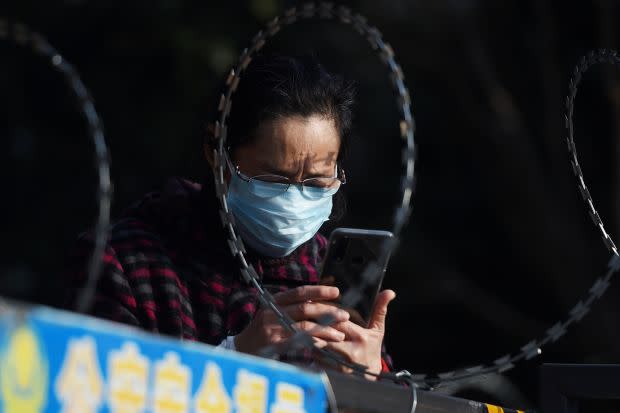Wuhan’s easing of coronavirus lockdown measures lasted all of three hours

China’s strategy of trying to project confidence that it has the coronavirus outbreak under control isn’t going so well.
In a confusing sequence of events today, the city of Wuhan, the epicenter of the outbreak, announced a policy of allowing some people there to leave in small groups, implying that the disease had been sufficiently contained to allow a relaxation of the lockdown. Yet three hours later, the decision was reversed.
The notice (link in Chinese) of the easing came from a special government task force dedicated to containing the spread of the epidemic in the city where 9 million still remain. The new rules would have allowed non-local residents, or those who have other illnesses and need to be treated elsewhere, among others, to leave. They needed to be physically healthy with no coronavirus symptoms, said the now-deleted notice, and would have been required to under a 14-day quarantine in their new destinations. Some of those stuck in Wuhan include people who are struggling to get treatment (paywall) for non-coronavirus-related diseases, as most local hospitals are mandated to only receive patients with the coronavirus.
The Wuhan task force then put out another notice revoking that announcement. “The earlier notice was released by the transportation team which did not run the decision for study and approval through the task force and its major leaders… We have criticized and punished colleagues who were responsible for [releasing the notice] seriously, and will firmly implement president Xi Jinping’s decree on preventing the export of the virus,” read the later announcement (link in Chinese).
In short: the local officials crossed more senior ones with their rash announcement, and would be duly punished.
The confusion over the lockdown measures suggest ongoing divisions between local governments and the central government in Beijing in managing the crisis. For example, provinces such as Shandong have started encouraging companies (link in Chinese) to resume work through means including cash incentives, though Xi emphasized in a speech (link in Chinese) yesterday that the situation is still “severe and complicated,” and urged local governments not to relax containment measures. Senior party officials have also taken to assigning blame for the handling of the epidemic to local officials, for example by replacing two party officials in Hubei province, possibly in a bid to deflect rising criticism directed at Xi and the party more broadly.
The initial announcement from the task force came amid an increasingly obvious effort on the part of Chinese authorities to communicate that the government succeeding in getting the coronavirus outbreak under control. Official statistics have shown a steady decrease in the number of new infections and deaths in recent days—though many experts continue to question the veracity of figures coming out of China, particularly as it has repeatedly changed its reporting methodology. The rapid spread of the disease in countries such as South Korea, Iran, and Italy is casting further doubt on whether the dramatically lower number of new cases coming out of China is believable.
If anything should give further pause to the narrative that the disease is being well managed in China, however, it’s the official cancellation of the most important meeting in the Communist Party’s calendar. The Standing Committee of the National People’s Congress, China’s legislature, announced today that it would postpone the annual political meetings known as “Two Sessions” from early March due to the epidemic.
Sign up for the Quartz Daily Brief, our free daily newsletter with the world’s most important and interesting news.
More stories from Quartz:
India may have only three confirmed cases of coronavirus but Indians aren’t taking any chances
Here’s more proof that Trump’s H-1B crackdown is only helping Canada
